Observance
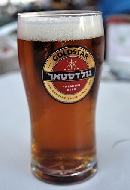 A Two-Day Weekend in Israel?
A Two-Day Weekend in Israel?Friday, July 8, 2011 by Elliot Jager | Jewish Ideas Daily » Daily Features
With July 4th behind them, Americans can look forward to closing out the summer season with Labor Day on September 5th. All told, they will enjoy ten national holidays. And, of course, they have the leisure of weekends.
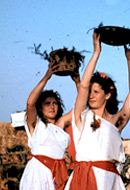 The Forgotten Festival
The Forgotten FestivalMonday, June 6, 2011 by Michael Carasik | Jewish Ideas Daily » Daily Features
The holiday of Shavuot, which begins this year on Tuesday evening, is the orphan among Jewish holidays; it is the forgotten festival. Let me count the ways.
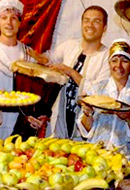 Mimouna!
Mimouna!Friday, May 13, 2011 by Aryeh Tepper | Jewish Ideas Daily » Daily Features
What did two million Israelis do when Passover ended this year? As in previous years, they celebrated Mimouna, a Moroccan Jewish holiday that is popularly observed by picnicking, barbecueing, and consuming moufletas (sweet North African pancakes). And what is Mimouna all about? No one really knows.
 Passover & the Repudiation of Idolatry
Passover & the Repudiation of IdolatryFriday, April 15, 2011 by Moshe Sokolow | Jewish Ideas Daily » Daily Features
Asking questions is a trademark of the Passover seder. Prior to it, we can ask another question—this one having to do with a passage in the Haggadah about the second of the four sons.
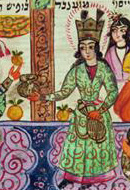 Purim Puzzles
Purim PuzzlesFriday, March 11, 2011 by Lawrence Grossman | Jewish Ideas Daily » Daily Features
Purim, Judaism's strangest holiday (which this year falls on March 20), is prescribed by what may be the strangest book in the Hebrew Bible, the scroll (m'gilah) of Esther. Two public readings of the book, one at night and the other in the morning, tell a story of Persian palace intrigue in the fifth century B.C.E., a recitation accompanied by the holiday's decidedly unspiritual noisemaking, tippling, and masquerade.
 From New Year to Arbor Day
From New Year to Arbor DayWednesday, January 19, 2011 by Moshe Sokolow | Jewish Ideas Daily » Daily Features
The holiday of Tu Bishvat ("the fifteenth of Shvat") falls this year on Thursday, January 20. What are its origins, and when and why did it become incorporated into the calendar as the Jewish "Arbor Day"?
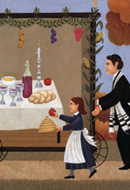 Be Joyful
Be JoyfulTuesday, September 21, 2010 by Yehudah Mirsky | Jewish Ideas Daily » Daily Features
Alongside the more colorful and distinctive rituals of the Sukkot festival—the taking-up of lulav and etrog, the sukkah itself—there is another command, less concrete and more penetrating: "And you will rejoice." Indeed, the passage in Deuteronomy (16: 14-15) concludes, v'hayita akh sameah, translatable as "you will be altogether joyful," or even "you will be only joyful."
 Orthodoxy and Innovation
Orthodoxy and InnovationMonday, September 13, 2010 by Aryeh Tepper | Jewish Ideas Daily » Daily Features
For many religiously observant Jews, the traditional siddur, or prayer book, constitutes a problem. One such Jew was the great hasidic rebbe, Nahman of Bratzlav (1772-1810), who articulated the problem in terms appropriate to his time: the fixed prayers, with their praises and petitions, are like a well-traveled highway, and well-traveled highways attract robbers. By which he meant that excessive routine makes it difficult to concentrate the mind.
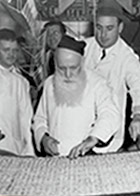 Thoroughly Modern Matzah
Thoroughly Modern MatzahThursday, March 25, 2010 | Jewish Ideas Daily » Daily Features
When Jews the world over sit down next week to mark the birth of Jewish history, matzah will figure prominently at the table. Matzah baking is an exacting task; according to traditional law, the entire process, from first kneading to exit from the oven, must be accomplished in 18 minutes flat, with not a speck of leaven in sight. For thousands of years, these specifications and others were laboriously met by hand. Yet this most ancient food has a modern history, too. The first matzah machine was invented in 1838 in France. With rabbinic approval, the technology moved steadily eastward. The...
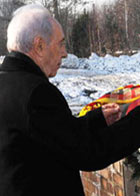 Holocaust Days
Holocaust DaysThursday, January 28, 2010 | Jewish Ideas Daily » Daily Features
Yesterday, Shimon Peres delivered an address, in Hebrew, before the Bundestag as Germany and other nations marked International Holocaust Day, commemorating the date in 1945 when Soviet forces arrived at Auschwitz. Israeli and American Jews conduct their own Holocaust remembrances in the spring, on the anniversary of the Warsaw Ghetto uprising. Ultra-Orthodox Jews, uneasy with the Zionist emphasis on force and resistance, hold their memorials on the tenth of Tevet, one of the traditional fast days for the destruction of the Temple. In short, the Holocaust remains as open to interpretation, reinterpretation—and misunderstanding—as is the hole it blew through all the history...
Editors' Picks
Absolute Citron Miriam Krule, Tablet. "It's easier to grow 2,000 acres of oranges or lemons than to grow one acre of etrogs," says California citrus farmer John Kirkpatrick, the only large-scale grower of the fruit in the U.S.
Shaken, Not Stirred David Rosenberg, Media Line. In developing innovative storage techniques for lulavim (palm fronds), Israel's technological prowess went head-to-head against an Egyptian embargo, and won.
Myrtle, Date Palm, Willow, Citron Arthur Schaffer, Tradition. What do the "four species" of Sukkot signify? A botanist finds an agricultural interpretation that would have been readily available to an ancient Israelite farmer. (PDF, 1982)
Yom Kippur at Sea Sam Kestenbaum, New York Times. A young Maine lobsterman takes time off on Yom Kippur to mend spiritual knots and refuel for the coming year. (2010)
Why Fast? Elli Fischer, Adderabbi. Expiation, corrective, a reflection of mood, or sensitization to the plight of the needy? Only one of these reasons has biblical support.
Bad Bans Brad Hirschfield, Washington Post. By banning bans on circumcision, California now drives the debate about this issue underground, where it will fester among the most hostile opponents of the practice.
Loaves and Wishes Vered Guttman, Washington Post. On Rosh Hashanah, cuisine becomes a system of meaning. (With recipes)
It's a Bird! It's a Challah! Leah Koenig, Forward. Rolls shaped like birds, symbols of divine protection and mercy, are among traditional Ashkenazi foods for Rosh Hashanah and the meal before Yom Kippur.
Where Faith is Weak, Life is Weak Jonathan Sacks, Jewish Chronicle. Intermarriage, assimilation, and vulnerability are not the causes but the symptoms of a transcendent malaise affecting a people once aflame with devotion.
Right of Reply Joseph J. Siev, Huffington Post. On the heated response of a prominent Reconstructionist rabbi to my article concerning the present condition of his movement.

